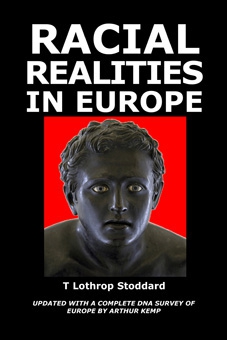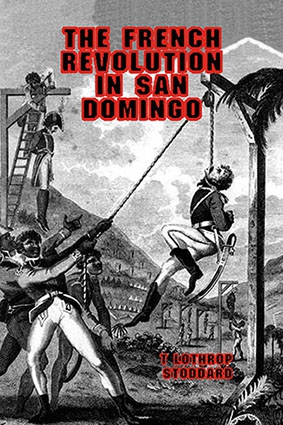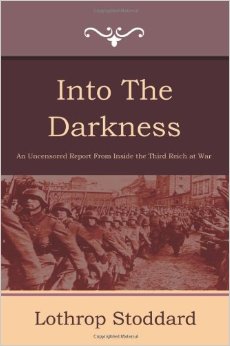jeudi, 01 janvier 2015
Theodore Lothrop Stoddard

Remembering Theodore Lothrop Stoddard (29 June 1883 - 1 May 1950)
Alex Kurtagic
Ex: http://www.wermodandwermod.com
American historian, journalist, anthropologist, and eugenicist Theodore Lothrop Stoddard was born 131 years ago today. A popular author and journalist until World War II, he was the author of 18 books, most published by a prestigious New York Publisher, Charles Scribner, including, The French Revolution in San Domingo (1914) and The Revolt Against Civilization (1922), of which we published new, annotated editions in 2011.
 Stoddard was the archetypical product of ivy-league education in the old United States. He graduated magna cum laude from Harvard University, studied law at Boston University, and obtained a PhD in history from Harvard University, later published as the aforementioned book on San Domingo (Haiti).
Stoddard was the archetypical product of ivy-league education in the old United States. He graduated magna cum laude from Harvard University, studied law at Boston University, and obtained a PhD in history from Harvard University, later published as the aforementioned book on San Domingo (Haiti).
Stoddard was closely associated with Madison Grant's circle of eugenicists and immigration restrictionists during the early part of the 20th century. His work, like that of his colleagues, is controversial today, and books like The Rising Tide of Colour (1920) set forth theses which would be rejected out of hand by present-day policy makers, even though said theses, if at times expressed in a language we would no longer use, have proven broadly correct, with the collapse of the European empires, the demographic trends of the past fifty years in Europe and North America due to mass immigration, the rise of Japan, and the rise of Islam as a threat to the West due to regious fanaticism. He also predicted a second world war and a war between Japan and the United States. Indeed, in his day, Stoddard's influence was significant, to the point of being alluded to in F. Scott Fitzgerald's The Great Gatsby. As is typical of American writers, then and now, and from all sides of the American political spectrum, Stoddard was accutely focused on human races, their characteristics, their relative status, and the conflicts of interests arising between them. As a representative of the old WASP establishment in his country, he was also preoccupied its continuity.
 But, while socially conservative, he was in every other sense a progressive liberal, strange as that may seem today: for him, eugenics was about improving the efficiency of human society—an aspiration well in keeping with the ideals of the Progressive Age in America, which was all about efficiency, wholesomeness, and purification (something not unrelated to Protestant ideals), and well in keeping with today's progressives, even if their approach is very different. Indeed, eugenics at this time (which was a generation or more before it fell into disrepute) was seen by its proponents as humane, and American writers made their case in terms of 'the right to be well born', and so forth. Today, this seems inconceivable, but let us think about this for a moment: is not pre-natal screening, and the option to abort a defective fetus, in effect congenial with eugenics, even if restricted to the welfare of individuals? And, given what we now know about epigenetics, would not efforts to improve the overall health of the population also congenial with eugenics? In future, it is likely parents will have the option to eliminate, initially by pre-natal prevention and later by means of therapy, congenital diseases and deformity through gene deactivation, replacement, or correction. While the cattle-breeding methods of the early eugenicists seem shocking to us—and it must be said, these methods were degrading, in that humans were treated like animals or livestock—so were some of the methods used in early medicine, before better ways were found to deal with injury and disease. Today's surgical methods may in future seem like butchery.
But, while socially conservative, he was in every other sense a progressive liberal, strange as that may seem today: for him, eugenics was about improving the efficiency of human society—an aspiration well in keeping with the ideals of the Progressive Age in America, which was all about efficiency, wholesomeness, and purification (something not unrelated to Protestant ideals), and well in keeping with today's progressives, even if their approach is very different. Indeed, eugenics at this time (which was a generation or more before it fell into disrepute) was seen by its proponents as humane, and American writers made their case in terms of 'the right to be well born', and so forth. Today, this seems inconceivable, but let us think about this for a moment: is not pre-natal screening, and the option to abort a defective fetus, in effect congenial with eugenics, even if restricted to the welfare of individuals? And, given what we now know about epigenetics, would not efforts to improve the overall health of the population also congenial with eugenics? In future, it is likely parents will have the option to eliminate, initially by pre-natal prevention and later by means of therapy, congenital diseases and deformity through gene deactivation, replacement, or correction. While the cattle-breeding methods of the early eugenicists seem shocking to us—and it must be said, these methods were degrading, in that humans were treated like animals or livestock—so were some of the methods used in early medicine, before better ways were found to deal with injury and disease. Today's surgical methods may in future seem like butchery.
The change in attitudes towards eugenics, and the scientific progress that has taken place since it was in vogue, has obscured the fact that its proponents were progressives. They truly wanted a better world, a more peaceful and civilised world. And in Stoddard's case this is even reflected in his analysis of foreign affairs. As a pacifist, for example, he was against intense nationalisms and called for fairer policy towards European colonial subjects. He had expertise in Islam and on affairs in the Islamic world, and was, for a time, a Eastern correspondent. In his writing he proved sympathetic towards the concerns of the peoples of these regions.
 Unfortunately for Stoddard, his investigation of conditions in Germany in the Winter of 1939 - 194o, which resulted in the book Into the Darkness: Nazi Germany Today, proved disastrous for his career. As a journalistic exercise, it made perfect sense: it was topical and controversial. In the heat of the war, however, his theories came to be seen as too closely aligned with those of the National Socialists. By the time he died in 1950, his passing went unnoticed.
Unfortunately for Stoddard, his investigation of conditions in Germany in the Winter of 1939 - 194o, which resulted in the book Into the Darkness: Nazi Germany Today, proved disastrous for his career. As a journalistic exercise, it made perfect sense: it was topical and controversial. In the heat of the war, however, his theories came to be seen as too closely aligned with those of the National Socialists. By the time he died in 1950, his passing went unnoticed.
I am told that Stoddard wrote an autobiography, which has never been published. Rumour has it that efforts have been made to get ahold of the manuscript, but that his son has consistently denied access to it. This is pity no matter the reasons, because such an autobiography is of historical interest, and could yield new insights into the time period and the individuals in Stoddard's circle, which had links to the highest levels of the American political establishment.
Bibliography:
The French Revolution in San Domingo, Houghton Mifflin Company, 1914.
Present-day Europe, its National States of Mind, The Century Co., 1917.
Stakes of the War, with Glenn Frank, The Century Co., 1918.[20]
The Rising Tide of Color Against White World-Supremacy, Charles Scribner's Sons, 1921 [1st Pub. 1920]. ISBN 4-87187-849-X
The New World of Islam, Charles Scribner's Sons, 1922 [1st Pub. 1921].
The Revolt Against Civilization: The Menace of the Under Man, Charles Scribner's Sons, 1922.
Racial Realities in Europe, Charles Scribner's Sons, 1924.
Social Classes in Post-War Europe. New York: Charles Scribner's Sons, 1925.
Scientific Humanism. New York: Charles Scribner's Sons, 1926.
Re-forging America: The Story of Our Nationhood. New York: Charles Scribner's Sons, 1927.
The Story of Youth. New York: Cosmopolitan Book Corporation, 1928.
Luck, Your Silent Partner. New York: H. Liveright, 1929.
Master of Manhattan, the life of Richard Croker. Londton: Longmans, Green and Co., 1931.
Europe and Our Money, The Macmillan Co., 1932
Lonely America. Garden City, NY: Doubleday, Doran, and Co., 1932.
Clashing Tides of Color. New York: Charles Scribner's Sons, 1935.
A Caravan Tour to Ireland and Canada, World Caravan Guild, 1938.
Into the Darkness: Nazi Germany Today, Duell, Sloan & Pearce, Inc., 1940.
00:05 Publié dans Biographie, Hommages | Lien permanent | Commentaires (0) | Tags : raciologie, lothrop stoddard, hommage, biographie |  |
|  del.icio.us |
del.icio.us |  |
|  Digg |
Digg | ![]() Facebook
Facebook



Les commentaires sont fermés.